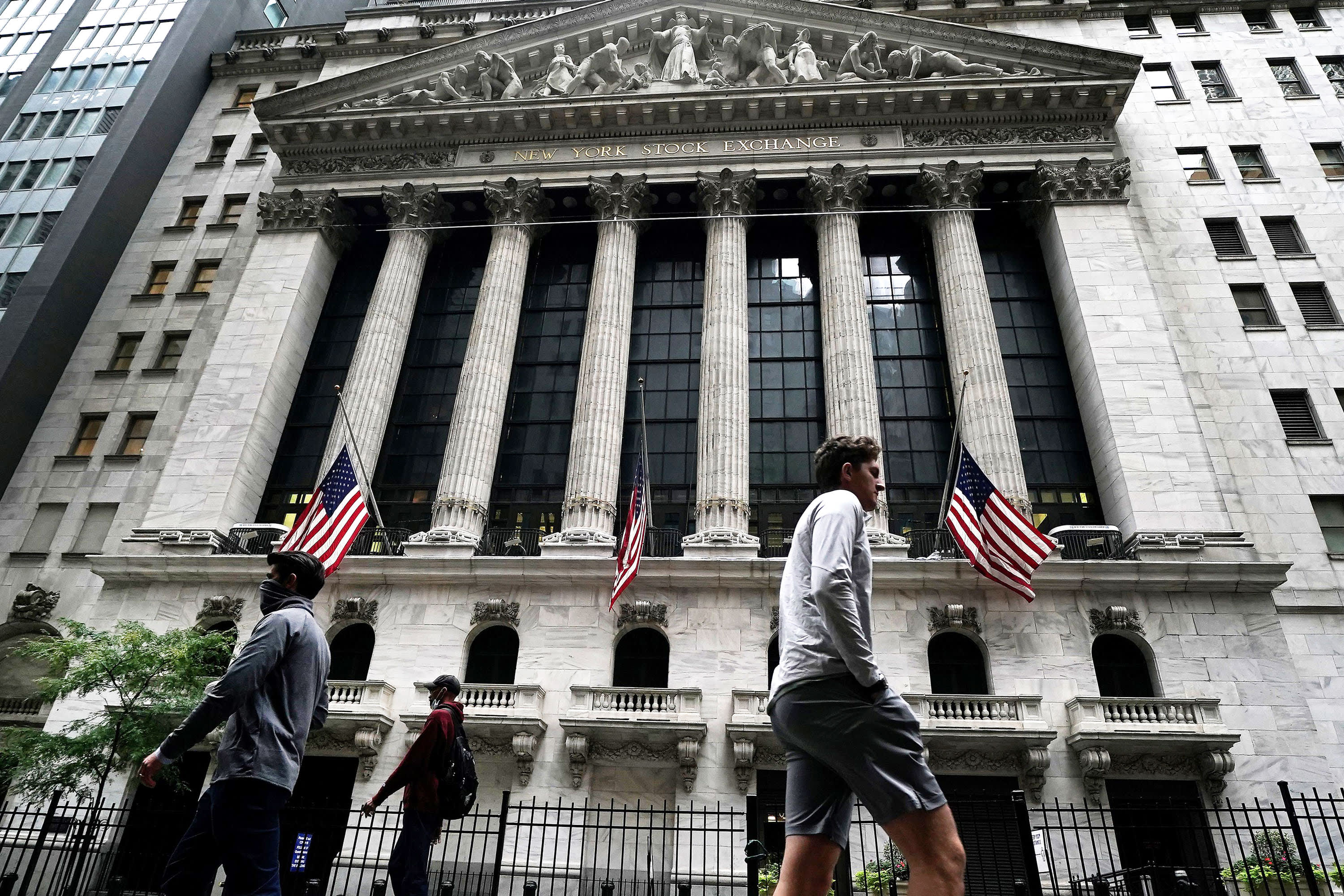Stocks fall following Trump’s positive virus test, but are off the worst levels on stimulus hopes

Stocks came under pressure on Friday after President Donald Trump’s coronavirus diagnosis fueled concerns about the election and the pandemic.
Major averages clawed back some of the steep losses after House Speaker Nancy Pelosi signaled aid for the airline industry could be coming soon, perhaps even as part of a much-anticipated broad relief bill.
The Dow Jones Industrial Average last traded lower by 70 points after dropping 430 points at its session low. The S&P 500 slid 0.7% after falling as much as 1.7%. The Nasdaq Composite declined 1.8%.
Shares of airlines jumped higher in unison after Pelosi called on the industry to delay furloughs, saying relief for airline workers is “imminent.” American Airlines and United erased earlier losses and popped as much as 3% each.
“We will either enact Chairman DeFazio’s bipartisan stand-alone legislation or achieve this as part of a comprehensive negotiated relief bill, extending for another six months the Payroll Support Program,” Pelosi said in a statement.
Earlier Friday, Pelosi said Trump’s illness changed the dynamic of stimulus talks, adding lawmakers will find the “middle ground” and will “get the job done.” The House passed the $2.2 trillion Democratic coronavirus stimulus bill Thursday night, while Treasury Secretary Steven Mnuchin has offered a $1.6 trillion package.
Still, the president’s illness added more uncertainty to the election, an event that was already weighing on the market and keeping traders on edge as they attempted to evaluate the possible outcomes. It also raised concerns about a second wave of the virus and a slower reopening.
White House physician Dr. Sean Conley said in a memo, “The President and First Lady are both well at this time, and they plan to remain at home within the White House during their convalescence.”
Conley also said he expects Trump to “continue carrying out his duties without disruption while recovering.”
White House chief of staff Mark Meadows said Friday Trump was having “mild” symptoms after testing positive for the virus and that he and Melania are in “good spirits.”
The Trump campaign announced that all events involving the president’s participation are going virtual or being temporarily postponed.
Vice President Mike Pence and second lady Karen Pence have both tested negative for the coronavirus, Pence’s spokesman said Friday. Mnuchin has also tested negative, the Treasury’s assistant secretary for public affairs said Friday.
“This October surprise raises the already high level of political uncertainty markets are dealing with as Election Day approaches,” said Jeff Buchbinder, equity strategist at LPL Financial. “Markets appear to be increasingly pricing Joe Biden in as the favorite, and this news may not change that, but Trump could gain support from a quick recovery.”
The Trump tweet initially knocked down Dow futures more than 500 points in overnight trading.
Dow futures overnight
“It really brings into stark reality that we are potentially going into … a second wave,” said Jeff Henriksen, co-founder and CEO of Thorpe Abbotts Capital, to CNBC’s “Squawk Box Europe.” “President Trump getting this really highlights that in a way that I think it will focus attention back on the virus and the effects it will have.”
(Readers can subscribe to CNBC PRO for more insights from Wall Street strategists.)
Technology shares declined with Apple, Amazon, Microsoft and Facebook all losing more than 1%. Tech stocks could come under pressure under a Democratic sweep scenario if it leads to higher tax rates and tighter regulations, many strategists have said.
Also weighing on the sentiment was a worse-than-expected September jobs report. Nonfarm payroll rose by 661,000 in September, the Labor Department said Friday in the final jobs report before the November election. Economists surveyed by Dow Jones expected a jobs gain of 800,000. The unemployment rate fell to 7.9% last month.
The sell-off in oil prices intensified as Trump’s coronavirus news added to the industry’s demand concerns. West Texas Intermediate crude, the U.S. oil benchmark, slid 4% to $37.10 per barrel on Friday.
“Investors should not panic over the news,” Sean Darby, global equity strategist at Jefferies, said in a note. “It was a tail risk since other global leaders have contracted the virus, but the forthcoming US election should not be delayed in any way… 2020 has seen many 2, 3, and even 4 sigma events, and this political tail risk is by no means as big.”
Stocks have staged a historic rebound since the economic shutdown sent stocks tumbling in March. But the major averages all finished September lower, snapping a five-month win streak, as doubts emerge about the pace and breadth of the recovery.
— CNBC’s Christine Wang and Elliot Smith contributed to this report.
Subscribe to CNBC PRO for exclusive insights and analysis, and live business day programming from around the world.




